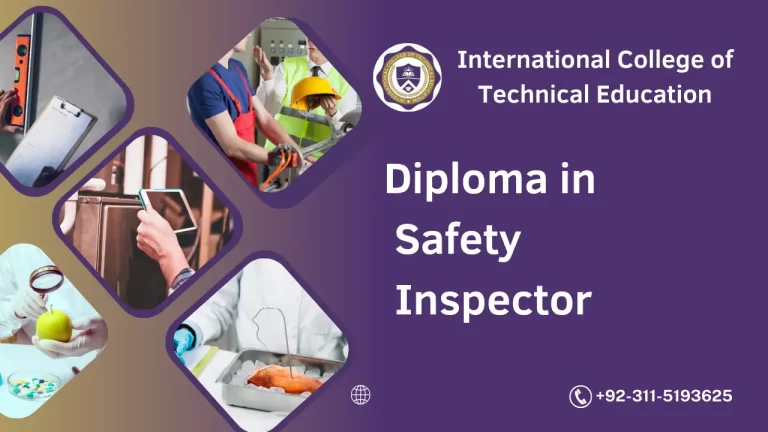In today’s world, safety is a priority for every organization, building, or establishment. Fire hazards pose serious threats, which makes having an effective fire alarm system in place essential. Trained professionals are crucial in ensuring that fire alarm systems are installed, maintained, and operated properly. This is where the Fire Alarm course in Sialkot comes in. This specialized course provides individuals with the knowledge and skills needed to work with fire alarm systems, ensuring safety and peace of mind for all.
The Fire Alarm course in Sialkot is designed to equip individuals with the skills necessary to design, install, test, and maintain fire alarm systems in residential, commercial, and industrial buildings. Fire alarm systems are a critical component of building safety, providing early detection of fires, alerting occupants, and ensuring that appropriate emergency procedures can be carried out effectively.
This course will cover everything from understanding the basics of fire alarm systems to more advanced aspects such as system integration, maintenance, and troubleshooting. It is designed to meet the needs of those looking to specialize in fire alarm technology, as well as those in the construction, electrical, and safety fields.
Course Overview
The Fire Alarm course in Sialkot provides a comprehensive introduction to fire alarm systems, exploring the various components and their functions. Participants will be taught the principles of fire alarm design and installation, the latest industry standards, and the practical skills required to maintain and troubleshoot fire alarm systems.
The course is a blend of theoretical knowledge and hands-on training, allowing students to practice working with actual fire alarm systems. Topics covered include the types of fire alarm systems, how they work, codes and standards, system components, installation, and testing methods.
Key topics include:
- Introduction to Fire Alarm Systems: Overview of fire alarm technologies, types of systems, and their importance in safety management.
- Fire Alarm Components and Operation: Understanding sensors, detectors, control panels, and alarm systems.
- Installation and Commissioning: Learning to install and test fire alarm systems according to regulatory codes.
- Maintenance and Troubleshooting: Regular maintenance practices and how to diagnose and resolve common issues.
- Fire Alarm System Integration: Integrating fire alarms with other safety systems like sprinklers, emergency lighting, and voice evacuation systems.
- Safety Standards and Codes: Understanding the national and international safety standards for fire alarm systems, such as NFPA codes, and how they influence installation and maintenance.
Study Units
The Fire Alarm course is divided into several study units, each designed to build upon the knowledge gained in the previous one. Here’s a breakdown of the key study units:
1. Introduction to Fire Alarm Systems
- The role of fire alarms in fire safety
- Types of fire alarms: Conventional, addressable, wireless
- Components of a fire alarm system: Detectors, control panels, notification devices, etc.
2. Understanding Fire Detection Technologies
- How different types of fire alarms detect smoke, heat, and carbon monoxide
- Common types of fire alarm detectors: Smoke detectors, heat detectors, flame detectors
- Limitations and advantages of each type of detector
3. Designing a Fire Alarm System
- Determining system requirements based on building layout and occupancy type
- System layout design: Placement of detectors, alarms, and control panels
- Ensuring compliance with national and international fire safety codes
4. Installation of Fire Alarm Systems
- Preparing the site for installation
- Wiring and connecting system components
- Integration with other safety systems such as emergency lights and sprinkler systems
5. Testing and Commissioning
- Methods for testing fire alarm systems to ensure functionality
- Performing the commissioning process to verify system effectiveness
- Troubleshooting common installation issues
6. Maintenance of Fire Alarm Systems
- Regular maintenance checks: Cleaning, testing, and battery replacement
- Understanding alarm signals and responding to faults
- Preventive measures to ensure long-term reliability
7. Fire Alarm System Codes and Standards
- Introduction to key safety codes and standards: NFPA, UL, BS 5839, etc.
- How to stay compliant with local and international regulations
- Ensuring that the system meets the requirements for both new installations and upgrades
Learning Outcomes
Upon successful completion of the Fire Alarm course in Sialkot, students will be able to:
- Understand Fire Alarm Systems: Gain in-depth knowledge of different types of fire alarm systems, their components, and their functionalities.
- Install Fire Alarm Systems: Demonstrate the ability to install and commission fire alarm systems in residential, commercial, and industrial settings.
- Troubleshoot and Maintain Systems: Be proficient in diagnosing and troubleshooting issues within fire alarm systems and implementing maintenance routines.
- Comply with Safety Standards: Understand and apply the relevant fire safety codes and regulations to ensure legal compliance and system safety.
- Integrate with Other Safety Systems: Learn to integrate fire alarms with other safety systems, such as sprinklers, emergency lighting, and evacuation systems.
- Perform System Testing: Effectively test fire alarm systems to ensure they are functioning properly and meet required standards.
- Understand Fire Safety Protocols: Be knowledgeable about the procedures to follow during a fire emergency, ensuring that the fire alarm system supports an effective evacuation process.
Course Benefits
The Fire Alarm course in Sialkot offers numerous benefits to students, including:
- Specialized Skills in a Growing Industry: As fire safety becomes a more critical concern for businesses and residential properties, the demand for skilled fire alarm professionals is on the rise. Completing this course will make you an expert in a high-demand field.
- Career Opportunities: Graduates can pursue careers as fire alarm technicians, safety engineers, or consultants, with opportunities in a variety of sectors, including construction, maintenance, and security.
- Practical Hands-On Training: Students gain real-world experience by working with actual fire alarm systems during the course, preparing them for immediate employment.
- Job Security: Fire alarm professionals are crucial to the safety and security of any building, ensuring high job security and the ability to work across different industries.
- High Earning Potential: Skilled fire alarm professionals are well-compensated for their expertise, with opportunities for career advancement and higher salaries as you gain experience and certifications.
- Compliance Knowledge: Understanding the latest fire safety standards ensures that you stay relevant in the industry and can advise clients on best practices for compliance.
Who Is This Course For?
The Fire Alarm course in Sialkot is suitable for:
- Aspiring Fire Alarm Technicians: Individuals interested in becoming professionals in the field of fire alarm systems.
- Electrical Engineers and Technicians: Those already in the electrical field who wish to specialize in fire alarm installation and maintenance.
- Safety Officers and Managers: Professionals in the field of safety and security looking to enhance their knowledge of fire alarm systems.
- Construction Industry Professionals: Architects, builders, and contractors who want to incorporate fire alarm system knowledge into their expertise.
- Facility Managers: Those responsible for managing buildings or facilities who need to ensure that fire alarm systems are installed and maintained correctly.
- Anyone Interested in Fire Safety: Individuals passionate about improving safety and security in various environments.
Future Progression for This Course
After completing the Fire Alarm course in Sialkot, there are numerous avenues for career growth and further progression:
- Advanced Certifications: Graduates can pursue advanced certifications in fire safety and alarm systems, such as NICET (National Institute for Certification in Engineering Technologies) or FPA (Fire Protection Association) certifications.
- Fire Safety Engineering: For those looking to further their knowledge, you can pursue a career as a fire safety engineer, specializing in the design and implementation of complex fire protection systems.
- Management Roles: Experienced fire alarm technicians may move into managerial roles, overseeing teams of technicians, or managing fire safety projects for large organizations.
- Fire Safety Consultant: With experience, you can become a fire safety consultant, advising organizations on how to improve fire safety measures and ensure compliance with fire codes and regulations.
- Entrepreneurship: Graduates with entrepreneurial aspirations can start their own fire alarm installation and maintenance businesses, providing specialized services to various clients.
The Fire Alarm course in Sialkot is an excellent choice for those looking to build a career in fire safety and protection. By gaining comprehensive knowledge of fire alarm systems, installation, maintenance, and troubleshooting, you will be prepared to enter a rewarding and growing field. Whether you are starting a career or seeking to specialize in a vital safety area, this course offers the skills and expertise needed to ensure the safety and security of others. With increasing demand for qualified fire alarm professionals, this course is a stepping stone toward a successful and stable career in fire safety.







